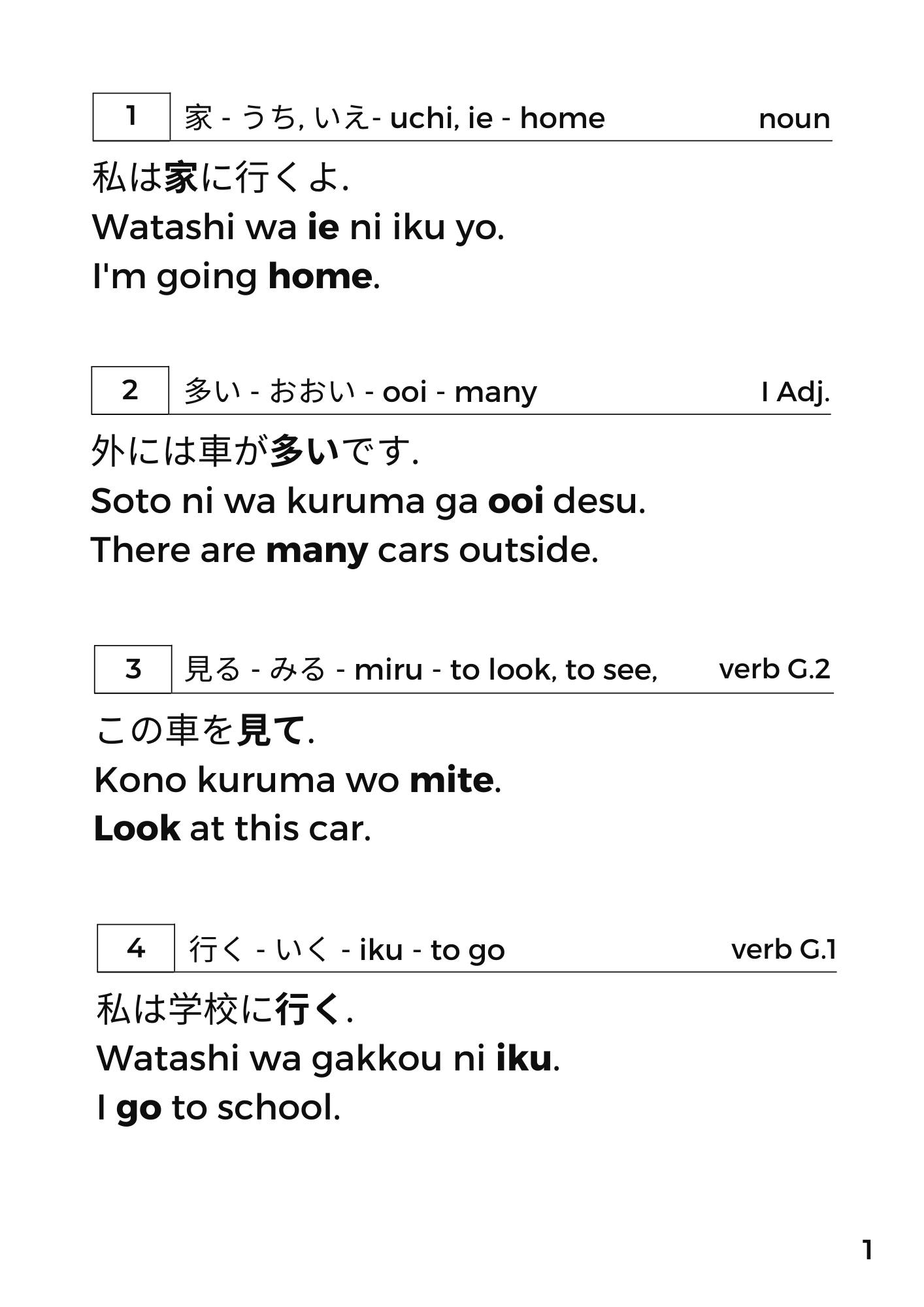
Learning a new language can be a daunting task, especially if you’re a beginner. Japanese, in particular, is a challenging language to learn, but don’t let that discourage you. With the right mindset and approach, anyone can master Japanese. In this article, we’ll be sharing some tips and tricks for beginners looking to learn Japanese.
Table of Contents
Why Should I Start Learning Japanese?
Before we dive into the tips and tricks, let’s talk about why you should consider learning Japanese in the first place.
Japan is a fascinating country with a rich culture, history, and traditions. Learning Japanese can not only help you understand and appreciate Japanese culture better but also open up opportunities for travel, work, and personal growth.
Moreover, Japanese is the ninth most widely spoken language globally, with over 128 million speakers. It’s also the language of popular anime, manga, and video games, making it a favorite among pop culture enthusiasts worldwide.
We listed 5 reasons why you should learn Japanese:

Cultural Immersion
Japanese culture is unique and fascinating. By learning the language, you can gain a deeper understanding of Japan’s history, traditions, and values. Whether you’re interested in anime, manga, or traditional Japanese arts, learning Japanese can help you connect with Japanese culture on a deeper level.
Business Opportunities
Japan is a global economic powerhouse, and learning Japanese can give you a competitive edge in the job market. Many multinational corporations operate in Japan, and fluency in Japanese can open up a world of business opportunities.
Travel
Japan is a popular tourist destination, and knowing Japanese can make your travels more enjoyable and immersive. From ordering food to asking for directions, speaking Japanese can help you navigate Japan with ease.
Personal Development
Learning a new language is a great way to challenge yourself and expand your horizons. Japanese is a complex language, and mastering it can give you a sense of accomplishment and boost your confidence.
Academic Pursuits
Japanese is a popular language to study in academic settings, and fluency in Japanese can open up opportunities for studying in Japan or conducting research on Japanese topics.
We can write more and more reasons but we think these are enough for now.

Tips and Tricks for Learning Japanese for Beginners
Now you understand why you should learn Japanese. It’s time to learn some useful tips and tricks to help you learn Japanese more efficiently and effectively.
Setting Goals
Learning a new language, especially a complex one like Japanese, can be a difficult challenge. It takes commitment, determination, and a clear sense of direction. Setting specific goals is an important part of learning Japanese because it helps you stay motivated and focused on your progress. To help you set goals, consider these advice.
The Importance of Setting Clear Goals in Learning Japanese:

1- Determine Your Purpose for Learning Japanese
Do you want to travel to Japan? Watch anime without subtitles? Work in a Japanese company? Whatever your reason, identifying your purpose will help you set specific goals and tailor your learning plan accordingly.
2- Set Realistic Goals
Start with small, achievable goals, such as learning hiragana and katakana or mastering basic grammar. As you progress, set more challenging goals, such as passing the JLPT (Japanese Language Proficiency Test).
3- Make a Study Plan
Make a study schedule that works with your schedule and learning preferences. Decide how much time you can commit to studying each day or week and what resources you’ll use, such as textbooks, online courses, or language exchange partners.
4- Break down your goals into smaller milestones
Learning a language is a long-term commitment, and it can be challenging to stay motivated if you only focus on the end goal. Break down your goals into smaller, achievable milestones, such as mastering a specific grammar point, learning a set number of vocabulary words, or completing a chapter in your textbook.
5- Keep track of your progress
Use a notebook, a spreadsheet, or a language learning app to track your progress and celebrate your achievements. Seeing how far you’ve come can help you stay motivated and inspired to continue.
Learning the Basics
Like any language, Japanese has its own set of grammar rules, vocabulary, and pronunciation. Here are some simple tips for learning the fundamentals:

6- Learn Hiragana and Katakana First
Japanese has three writing systems (Kanji, Hiragana and Katakana.) Hiragana and katakana are the two basic writing systems in Japanese. Fortunately, they’re relatively easy to learn, with only 46 characters each. Hiragana is the basic phonetic script, while Katakana is used for foreign words and emphasis. Learning these two scripts is essential for reading and writing in Japanese, and it’s a great starting point for beginners.
Here is our article about how you can learn Hiragana
Our Hiragana practice sheet for beginners
7- Build Your Vocabulary
Vocabulary is the building block of any language, and Japanese is no exception. Start with simple words and phrases, such as greetings, numbers, and common nouns. Practice using them in simple sentences and gradually expand your vocabulary. Flashcards and language learning apps can be helpful tools for memorizing new Japanese words.
Check out my eBook about The Most Used 600 Japanese Words

8- Master Basic Grammar
Learning Japanese grammar can be a daunting task for those who are new to the language. With its unique structure and rules, it can be quite different from English grammar. However, mastering the basics of Japanese grammar is crucial for building a strong foundation in the language. First, learn the basics.
In order to learn basic Japanese grammar, it’s important to start with the fundamentals. This means understanding basic sentence structures and verb conjugations. From there, learners can gradually move on to more complex concepts, such as particles, conjugation patterns, and honorific language.
One of the best ways to start learning basic Japanese grammar is by using textbooks or online resources that are specifically designed for language learners. These resources will typically include clear explanations of grammar concepts, as well as exercises and examples to help reinforce understanding.
While learning Japanese grammar can be challenging, it’s also an essential part of building strong language skills. With dedication and practice, learners can gain a solid foundation in grammar and begin to communicate effectively in Japanese.
9- Practice Pronunciation
Japanese has a unique sound system that may be challenging for beginners. Practice pronouncing vowels, consonants, and syllables correctly, and learn the intonation patterns of Japanese sentences.
Immersing Yourself in Japanese
Learning Japanese goes beyond textbooks and courses. Immersing yourself in the Japanese language is an excellent way to improve your listening and speaking skills, learn new vocabulary, and gain a deeper understanding of Japanese culture. Here are some tips for immersing yourself in Japanese:

10- Watch Japanese TV Shows, Anime, and Movies
Watching Japanese TV shows, anime, and movies can expose you to authentic Japanese language, accents, and expressions. You can also use subtitles or Japanese audio with English subtitles to improve your listening and reading skills.
11- Listen to Japanese Music and Podcasts
Listening to Japanese music and podcasts can help you learn new vocabulary and phrases, and improve your listening skills. Try to sing along to Japanese songs or repeat phrases from podcasts.
12- Join a Language Exchange Program
Joining a language exchange program, whether online or in-person, can be a great way to practice your Japanese speaking skills with native speakers. You can also learn about Japanese culture and make new friends.
13- Travel to Japan
Traveling to Japan is an immersive experience that can help you improve your Japanese skills and gain firsthand knowledge of Japanese culture. You can practice your speaking skills, try new foods, and visit famous landmarks.
Staying Motivated
Learning Japanese can be challenging, and it’s easy to lose motivation. Follow these advices to stay motivated as you’re learning Japanese.

14- Celebrate Small Wins
Celebrating small wins, such as mastering a new vocabulary or understanding a difficult grammar concept, can boost your motivation and confidence.
15- Join a Study Group
Deciding to join a study group can keep you accountable and motivated. You can also share learning resources and tips with other learners.
16- Take Breaks
To stay focused and prevent burnout, taking breaks is essential. Take a walk, exercise, or do something you enjoy to recharge your energy.
Conclusion
Thank you for reading our article! Learning Japanese is a challenging but rewarding experience. With the right mindset and approach, anyone can master Japanese. Remember to set clear goals, learn the basics, immerse yourself in Japanese culture, and stay motivated. Continue to practice Japanese and don’t be afraid to fail. Good luck!
Read more articles about Japanese language and Japan.
FAQs
- How Long Does It Take to Learn Japanese?
The time it takes to learn Japanese depends on your learning style, goals, and dedication. It can take anywhere from six months to several years to become proficient in Japanese.
- What Are the Hardest Parts of Learning Japanese?
The hardest parts of learning Japanese for most learners are the unique writing system, complex grammar, and pronunciation.
- Is it necessary for me to learn both Hiragana and Katakana?
Yes, learning both hiragana and katakana is essential to read and write Japanese.
- Can I Learn Japanese Online?
Yes, there are many online resources for learning Japanese, such as courses, apps, and language exchange programs. Also you can learn Japanese with our website.
- Is Japanese a Useful Language to Learn?
Yes, Japanese is a useful language to learn for travel, work, and personal growth. It’s also the language of popular anime, manga, and video games.








